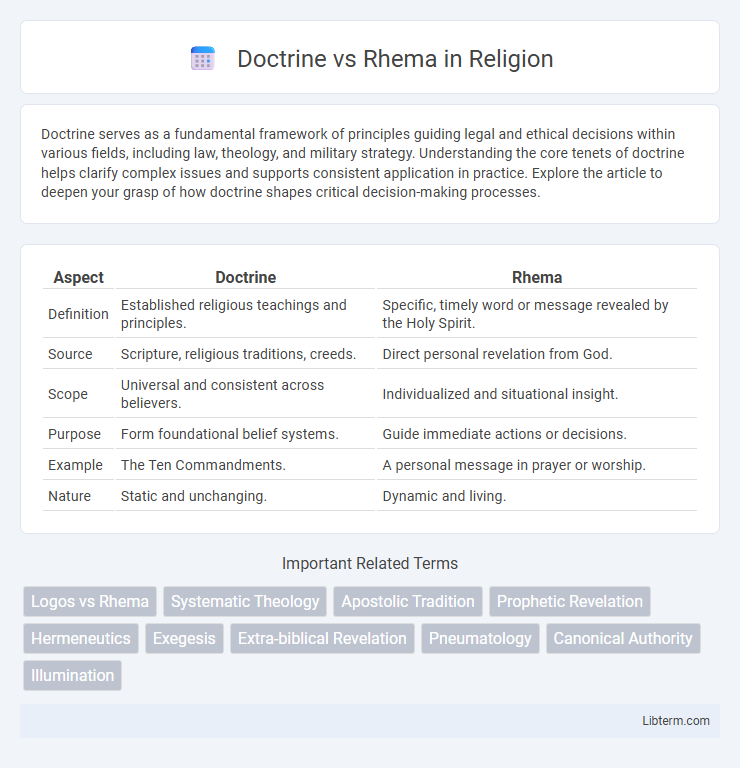Doctrine serves as a fundamental framework of principles guiding legal and ethical decisions within various fields, including law, theology, and military strategy. Understanding the core tenets of doctrine helps clarify complex issues and supports consistent application in practice. Explore the article to deepen your grasp of how doctrine shapes critical decision-making processes.
Table of Comparison
| Aspect | Doctrine | Rhema |
|---|---|---|
| Definition | Established religious teachings and principles. | Specific, timely word or message revealed by the Holy Spirit. |
| Source | Scripture, religious traditions, creeds. | Direct personal revelation from God. |
| Scope | Universal and consistent across believers. | Individualized and situational insight. |
| Purpose | Form foundational belief systems. | Guide immediate actions or decisions. |
| Example | The Ten Commandments. | A personal message in prayer or worship. |
| Nature | Static and unchanging. | Dynamic and living. |
Understanding Doctrine: Definition and Importance
Doctrine refers to a system of beliefs or teachings formally established by a religious organization, serving as a framework for faith and practice. Its importance lies in providing consistency, guiding moral decisions, and unifying adherents through shared principles. Understanding doctrine enables clearer interpretation of scripture and fosters doctrinal integrity within a faith community.
What is Rhema? A Closer Look
Rhema refers to the specific, revealed word or message from God that resonates personally and spiritually with an individual at a particular moment, distinct from the general doctrine which is more broad and systematic. It emphasizes a direct, personal communication often experienced through prayer, scripture, or inspiration, providing timely guidance or encouragement. This nuanced understanding of Rhema highlights its dynamic and situational nature within Christian theology compared to fixed doctrinal teachings.
Doctrine vs Rhema: Key Differences
Doctrine represents established teachings and formalized beliefs within religious traditions, often derived from sacred texts and authoritative interpretation. Rhema refers to the dynamic, personal revelation or spoken word from God, experienced subjectively by individuals during prayer or inspiration. The key difference lies in Doctrine's objective, structured framework compared to Rhema's individualized, experiential nature.
The Role of Doctrine in Christian Faith
Doctrine serves as the foundational framework of Christian faith, providing essential theological teachings that shape believers' understanding of God, salvation, and moral principles. It establishes a consistent, authoritative guide for interpreting Scripture and maintaining doctrinal unity within the church. The role of doctrine is crucial in preserving orthodoxy and ensuring a coherent expression of faith across diverse Christian communities.
Rhema: Personal Revelation and Its Impact
Rhema refers to personal revelation or the specific utterance God gives to individuals, distinct from the broader, established Doctrine found in Scriptures. Rhema serves as a living word tailored to guide, comfort, or instruct believers in unique circumstances, often prompting immediate action or spiritual growth. Its impact lies in fostering a dynamic relationship with God, enabling believers to experience divine guidance beyond general doctrinal truths.
Scriptural Foundations for Doctrine and Rhema
Doctrine is grounded in the consistent, established teachings of Scripture, reflecting the whole counsel of God as revealed through canonical texts like the Bible, emphasizing facts and timeless truths. Rhema refers to specific, timely divine revelations or personal insights from Scripture instilled by the Holy Spirit, often connected to particular circumstances or guidance, supported by passages such as Ephesians 6:17 and Luke 1:38. Both concepts are rooted in the authority of Scripture but serve distinct roles: doctrine provides a stable foundation of truth, while rhema represents living, active communication from God to individuals.
Balancing Doctrine and Rhema in Spiritual Growth
Balancing doctrine and rhema in spiritual growth involves integrating established biblical teachings with timely, personal revelations from the Holy Spirit. Doctrine provides a foundational framework rooted in scripture's unchanging truths, while rhema offers specific, situational guidance that addresses immediate spiritual needs. Effective spiritual growth requires discerning when to uphold doctrinal integrity and when to embrace rhema for dynamic, Spirit-led transformation.
Common Misconceptions About Doctrine and Rhema
Doctrine is often misunderstood as rigid and unchanging, whereas Rhema is mistakenly seen as purely emotional or subjective revelation. Doctrine represents established biblical truths foundational to Christian faith, while Rhema refers to specific, timely insights or guidance from the Holy Spirit for individual circumstances. Clarifying this distinction helps prevent confusion between timeless scripture and personal spiritual experiences.
Potential Dangers of Overemphasizing Doctrine or Rhema
Overemphasizing doctrine can lead to rigid legalism, stifling spiritual growth and personal experience, while prioritizing rhema risks subjective interpretations that may cause confusion or deception. An imbalance between established biblical teachings (doctrine) and dynamic, personal revelation (rhema) may hinder holistic faith development and foster division within communities. Safeguarding against extremes requires integrating sound theological principles with discerning individual insights to maintain doctrinal integrity and spiritual vitality.
Cultivating a Healthy Approach to Doctrine and Rhema
Cultivating a healthy approach to Doctrine and Rhema involves balancing structured biblical teachings with inspired, Spirit-led revelations that address specific situations. Emphasizing sound theology grounded in Scripture helps prevent misinterpretations, while openness to Rhema fosters personal spiritual growth and timely guidance. Maintaining this equilibrium ensures faith remains both rooted and dynamic, promoting wisdom and discernment in everyday life.
Doctrine Infographic

 libterm.com
libterm.com